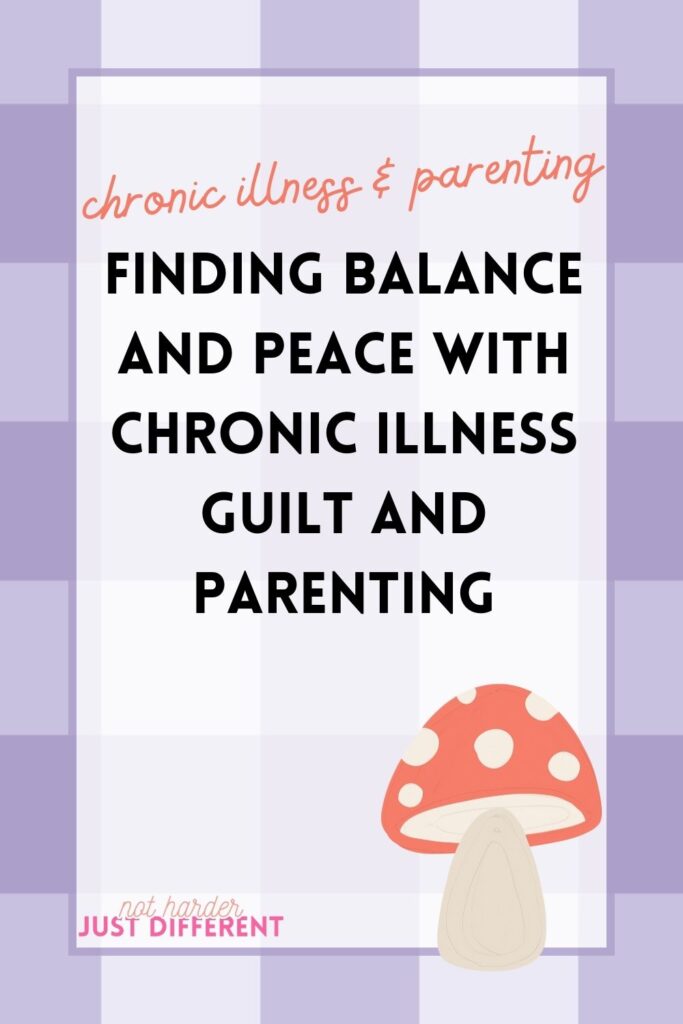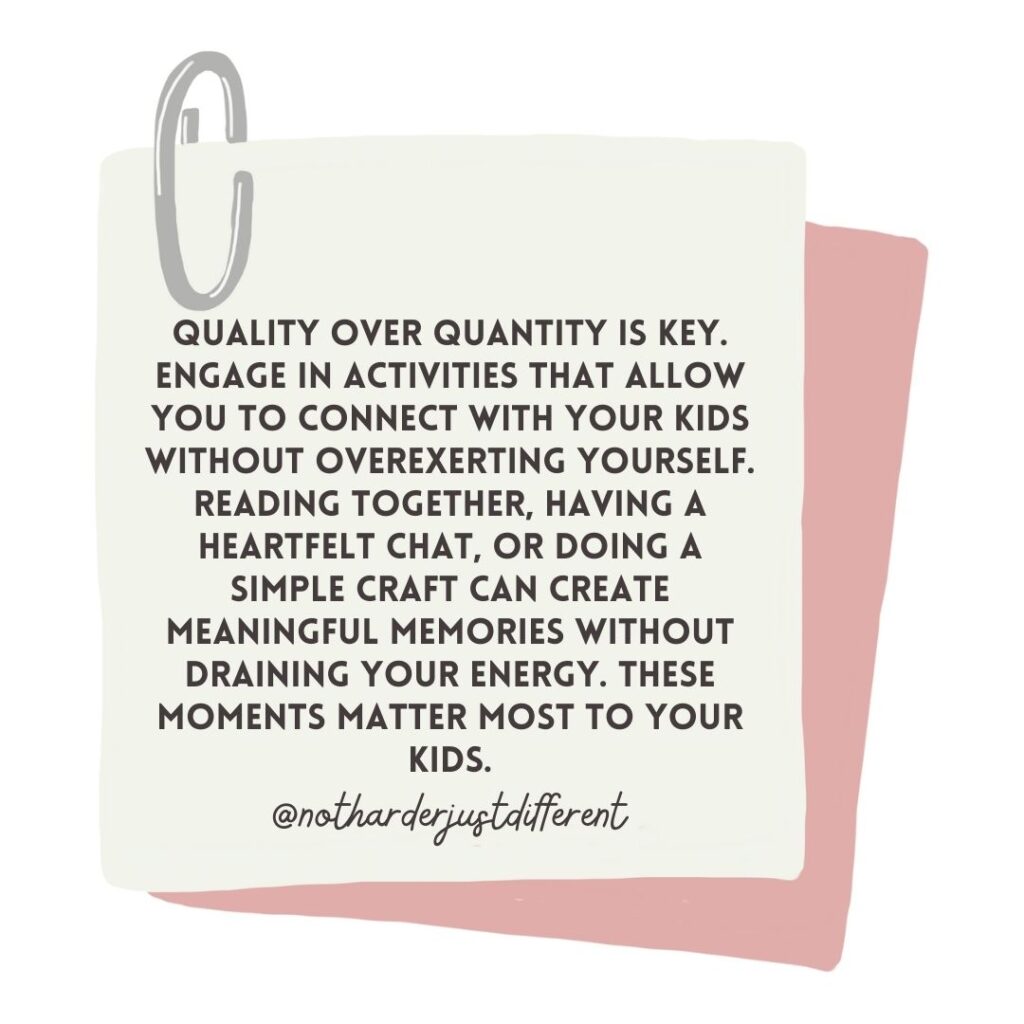Disclaimer: As a future Licensed Clinical Social Worker (LCSW) currently pursuing my master’s degree, I am passionate about sharing insights and information related to parenting, autism and homeschooling based on my personal experiences and research. However, the content shared on this blog is not intended to substitute professional advice, diagnosis, or treatment. Parenting is a deeply personal journey, and while I strive to provide valuable insights, every family and situation is unique. Readers are encouraged to consult with qualified professionals for personalized guidance tailored to their specific needs and circumstances.
If you’re navigating the tricky path of parenting while dealing with a chronic illness, you’re probably no stranger to guilt. It’s that nagging feeling that you’re not doing enough, even when you’re giving it your all. Trust me, you’re not alone in this. I’ve dealt with my fair share of chronic illness guilt and parenting.
Balancing the demands of being a parent with the ups and downs of a chronic illness can feel overwhelming. You might worry about missing out on activities with your kids or not being as present as you’d like. It’s a tough gig, but here’s the good news: you can manage these feelings and still be an amazing parent.
Let’s chat about what chronic illness guilt looks like, why it happens, and how to find a healthy balance. With a few practical strategies and a lot of self-compassion, you can navigate this journey with more peace and confidence. Ready? Let’s dive in!

Understanding Chronic Illness Guilt and Parenting
What is Chronic Illness Guilt?
Chronic illness guilt in parenting is that heavy feeling of not being able to meet all your parenting expectations due to your health condition. You might feel like you’re constantly letting your kids down or not being the parent you envisioned. This guilt is common among parents with chronic illnesses, and recognizing it is the first step to managing it.
Why Do We Feel Guilty?
Guilt often stems from comparing ourselves to other parents or to our pre-illness selves. Society has high expectations for parents, and it’s easy to feel like you’re falling short. But it’s important to remember that your worth as a parent isn’t defined by what you can’t do. It’s about the love and care you give, even on tough days.
Managing Chronic Illness Guilt
Embrace Your Limits
Accepting your limitations is crucial. It doesn’t mean you’re failing; it means you’re human. Embrace your reality and focus on what you can do. Adjusting your expectations can help reduce feelings of inadequacy. Remember, your best is always enough, even if it looks different from others.

Focus on Quality Time
Quality over quantity is key. Engage in activities that allow you to connect with your kids without overexerting yourself. Reading together, having a heartfelt chat, or doing a simple craft can create meaningful memories without draining your energy. These moments matter most to your kids.
Lean on Your Support System
Don’t hesitate to ask for help from friends, family, or support groups. Surround yourself with people who understand your situation and can offer assistance. Whether it’s babysitting, helping with chores, or just providing a listening ear, a strong support network can lighten your load.
Communicate Openly with Your Kids
Be honest with your children about your illness in an age-appropriate way. Let them know why some days you might need more rest. This transparency fosters understanding and teaches them empathy. Reassure them that you love them and are doing your best to be there for them.
Prioritize Self-Care
Taking care of yourself is essential. Incorporate rest and relaxation into your routine to recharge. Simple self-care practices, like taking a warm bath, meditating, or enjoying a hobby, can make a big difference. When you prioritize your health, you’re better able to care for your family.
Practical Tips for Balancing Parenting and Illness
Set Realistic Goals
Set achievable goals each day based on your energy levels. Focus on what’s essential and let go of tasks that can wait. Break larger tasks into smaller, manageable steps to avoid feeling overwhelmed.
Create a Flexible Schedule
A flexible schedule allows you to adjust your plans based on how you’re feeling. Plan activities during times when you have more energy and incorporate regular breaks to rest. Flexibility helps you manage your day without feeling pressured.
Use Technology to Your Advantage
Leverage technology to simplify your life. Online grocery shopping, meal delivery services, and virtual playdates can save you time and energy. There are also numerous apps designed to help with organization, medication reminders, and health tracking.
Delegate When Possible
Don’t be afraid to delegate tasks to your partner, older kids, or other family members. Assign age-appropriate chores to your children to involve them in household responsibilities. Delegating helps distribute the workload and teaches kids valuable life skills.
Celebrate Small Wins
Acknowledge and celebrate your achievements, no matter how small. Completing a task, having a good day with your kids, or simply getting through a challenging day are all victories. Celebrating these wins boosts your morale and keeps you motivated.
Finding Peace with Your Parenting Journey
Connect with Other Parents
Join support groups or online communities where you can connect with other parents facing similar challenges. Sharing experiences and advice can provide comfort and validation. Knowing you’re not alone in your journey can make a big difference.
Practice Mindfulness
Incorporate mindfulness practices into your daily routine to stay present and reduce stress. Techniques like deep breathing, meditation, and gentle yoga can help calm your mind and body. Mindfulness helps you stay connected to the present moment, easing feelings of guilt.
Seek Professional Support
Consider talking to a therapist or counselor who specializes in chronic illness and parenting. Professional support can provide you with coping strategies and a safe space to express your feelings. Therapy can be a valuable resource in managing guilt and finding balance.
Navigating chronic illness guilt while parenting is challenging, but with these tips, you can find a way to balance both roles. Remember, you’re doing an incredible job managing your health and caring for your family. Be kind to yourself, and take things one day at a time. You’ve got this!

